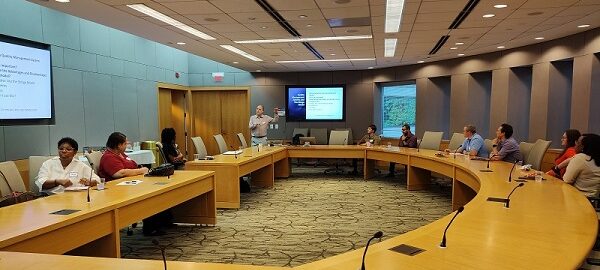ASQ Raleigh held its second Six Sigma Special Interest Group (SIG) meeting of the year in the NC Biotech Center on September 23. Eleven people, including five non-ASQ members, came to the meeting for an evening of discussion. We were pleased to see seven first-timers who came because of interest in Quality Management Systems (QMS), the Shingo Model, or just Six Sigma and Continuous Improvement in general.
Our speaker, Tim Whetten, had previously led the discussion on QMS and the Shingo Model during our March SIG meeting. This time Tim went deeper and compared the Shingo Model to other frameworks, such as Baldrige, EFQM, and ISO9001.
While each of the frameworks has their unique design, components, primary markets and audience, they share many principles in quality and organization excellence, such as value, customer focus, and systems thinking.
After the initial presentation by Tim, the participants formed small groups and discussed the challenges and opportunities in implementing or improving QMS in their organizations. The participants shared their experience in QMS (or lack thereof) and pitfalls in its implementation. Many questions were raised during the discussion, for example
- How is QMS different or related to general management?
- How do organizations know which framework is best for them?
- What is the right path given the organization’s current state?
- What are some elements that are critical to QMS implementation?
As Tim continued his presentation, many discussion points converged to organization’s purpose, culture, leadership, cross-functional alignment, and employee engagement. All seemed to agree that QMS is not a tool or check-box exercises. It’s easy to fall into the mindset that “if we had a QMS tool, we have a QMS. ” QMS is much more central and integral to the entire organization than a software system.
Tim concluded the meeting by offering suggestions for next steps in “making it real” — what can we start doing now? One piece of his advice was Quality needs to “be helpful” to other stakeholders. Simple, but hard to do.
After over 2 hours of engaging discussion, the participants left the meeting with many thought-provoking questions and shared ideas.

